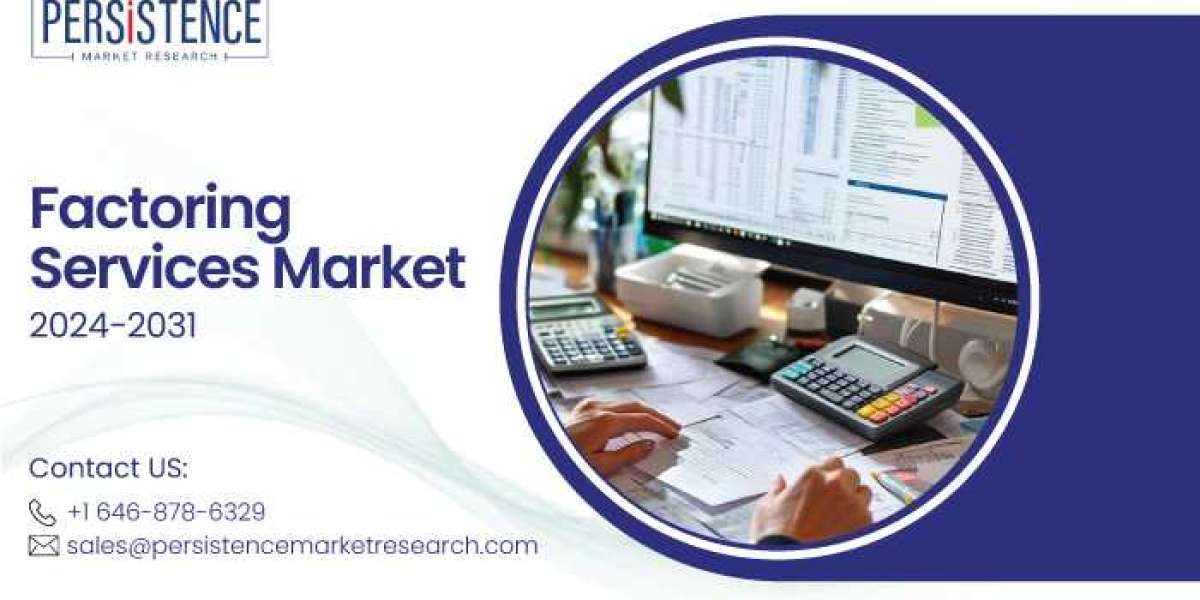Maintaining steady cash flow is a top priority for most businesses, but the process of waiting for customers to pay invoices can be a significant challenge. Payment terms that stretch 30, 60, or even 90 days often leave businesses strapped for cash, making it difficult to cover operational expenses, invest in growth, or meet payroll obligations. That’s where Accounts Receivable (AR) Factoring comes into play.
What is AR Factoring?
Accounts Receivable (AR) factoring, also known simply as factoring, is a financial service where businesses sell their unpaid invoices (accounts receivable) to a third-party company, called a factoring company or factor, in exchange for immediate cash. Instead of waiting for customers to pay, businesses receive an advance on the invoice value—usually 70-90%—allowing them to unlock cash flow to manage day-to-day expenses or invest in new opportunities.
Read More: https://www.persistencemarketresearch.com/market-research/factoring-services-market.asp
Once the factoring company collects the payment from the customer, the remaining balance is released to the business, minus a small factoring fee.
Unlike traditional loans, AR factoring is not debt-based financing. Businesses are not borrowing money but are selling a financial asset (their invoices), making AR factoring a debt-free way to access working capital.
How Does AR Factoring Work?
The process of AR factoring is simple and straightforward:
Submit Invoices: A business provides goods or services to its customers and issues invoices with payment terms, often 30 to 90 days.
Sell Invoices: The business sells its unpaid invoices to a factoring company. The factor evaluates the invoices and the creditworthiness of the customers to ensure they are likely to pay on time.
Receive Advance: Once approved, the factoring company advances a percentage of the invoice value, usually between 70% and 90%, to the business. This advance is paid within 24-48 hours of approval.
Collection by Factor: The factoring company takes over the responsibility of collecting payment from the customer when the invoice is due.
Remaining Balance Released: When the customer pays the invoice in full, the factor releases the remaining balance to the business, after deducting the agreed-upon factoring fee.
Types of AR Factoring
There are different types of AR factoring available depending on the needs and risk tolerance of the business. Here are the most common options:
1. Recourse Factoring
In recourse factoring, the business remains responsible for any unpaid invoices. If the customer fails to pay, the business must reimburse the factoring company for the advance. Recourse factoring usually comes with lower fees, as the factoring company takes on less risk.
- Best for: Businesses with reliable customers and a lower risk of non-payment.
2. Non-Recourse Factoring
With non-recourse factoring, the factoring company assumes the risk if a customer defaults or is unable to pay. This means that if the customer becomes insolvent or fails to pay due to financial problems, the factoring company bears the loss. Non-recourse factoring is generally more expensive because of the added risk to the factoring company.
- Best for: Businesses looking to protect themselves from bad debt and the risk of customer insolvency.
3. Spot Factoring
Spot factoring allows businesses to factor individual invoices on an as-needed basis, rather than factoring all of their receivables. This provides flexibility for businesses that only need occasional cash flow boosts.
- Best for: Businesses that want flexibility and prefer to factor invoices selectively.
Key Benefits of AR Factoring
AR factoring offers several advantages that can help businesses improve their cash flow, reduce financial stress, and grow without taking on debt. Here are some of the main benefits:
1. Immediate Cash Flow
The primary benefit of AR factoring is the immediate access to cash. Instead of waiting for customers to pay, businesses can receive up to 90% of the invoice value within a day or two of approval. This ensures that companies have the working capital they need to cover operational expenses, purchase inventory, pay employees, and take on new projects.
- Why it matters: Cash flow is the lifeblood of any business. Factoring provides liquidity when it’s needed most, preventing cash flow gaps that could otherwise disrupt operations.
2. No Debt Incurred
Factoring is not a loan, which means businesses don’t take on additional debt when they sell their invoices. Instead, they’re selling a financial asset—their receivables—in exchange for cash. This allows businesses to improve their cash flow without increasing their liabilities or negatively impacting their credit score.
- Why it matters: Factoring allows businesses to access working capital without the risks and obligations associated with debt, making it a suitable option for companies that may not qualify for traditional financing.
3. Outsourced Collections
When you factor your invoices, the factoring company takes over the responsibility of collecting payment from your customers. This frees up time and resources, allowing your business to focus on its core operations rather than spending time and effort on collections and follow-ups.
- Why it matters: Chasing down late payments can be time-consuming and stressful. By outsourcing collections to a factoring company, businesses can streamline their financial processes and reduce administrative burdens.
4. Flexible Financing
Factoring is a flexible financing option that grows with your business. As your sales increase and you generate more invoices, you can factor more receivables and access more cash. Unlike traditional bank loans, which may have fixed limits, AR factoring allows you to access funds based on the value of your receivables.
- Why it matters: Factoring provides a scalable solution that adjusts to the needs of your business, making it ideal for companies experiencing rapid growth or fluctuating cash flow.
5. Better Customer Credit Management
Many factoring companies assess the creditworthiness of your customers before purchasing your invoices. This can help you identify high-risk clients and avoid potential bad debt. Some factoring companies also offer credit protection with non-recourse factoring, where they assume the risk if your customer fails to pay.
- Why it matters: By factoring your invoices, you can reduce the risk of working with unreliable customers and better manage your company’s credit exposure.
Who Can Benefit from AR Factoring?
AR factoring is a flexible financing solution that can benefit businesses of all sizes, but it is especially useful for small and medium-sized enterprises (SMEs) and industries with long payment cycles. Here are some examples of businesses that can benefit from factoring services:
Manufacturing: Manufacturing companies often face long payment cycles and need steady cash flow to fund production costs, purchase raw materials, and pay employees. Factoring helps manufacturers bridge the gap between production and payment.
Transportation and Logistics: Trucking and logistics companies frequently deal with delayed payments from customers, making it difficult to cover fuel, maintenance, and payroll expenses. Factoring provides immediate cash to cover these essential costs.
Staffing Agencies: Staffing companies typically pay their employees weekly or bi-weekly but may not receive payments from clients for 30-60 days. Factoring ensures they have the cash needed to pay their workforce on time.
Construction: The construction industry often works on a project basis, with long delays between project completion and payment. Factoring helps construction companies maintain steady cash flow while waiting for clients to pay.
Wholesale and Distribution: Wholesalers and distributors can use factoring to improve cash flow while waiting for retail customers to settle their invoices, ensuring they can continue purchasing inventory and fulfilling orders.
Conclusion
AR factoring is a powerful financial tool that allows businesses to unlock cash flow by selling their unpaid invoices. With immediate access to working capital, no debt, and outsourced collections, factoring provides an effective solution to the common cash flow challenges businesses face, especially in industries with long payment terms.
Whether you need to cover operating expenses, take on new opportunities, or scale your business, factoring can provide the financial flexibility and liquidity needed to keep your company on track. By partnering with a factoring company, you can ensure that cash flow remains steady, allowing you to focus on growing your business and serving your customers.
If your business struggles with cash flow due to delayed payments, AR factoring might be the ideal solution to help you stay financially strong and agile in today’s competitive marketplace.








